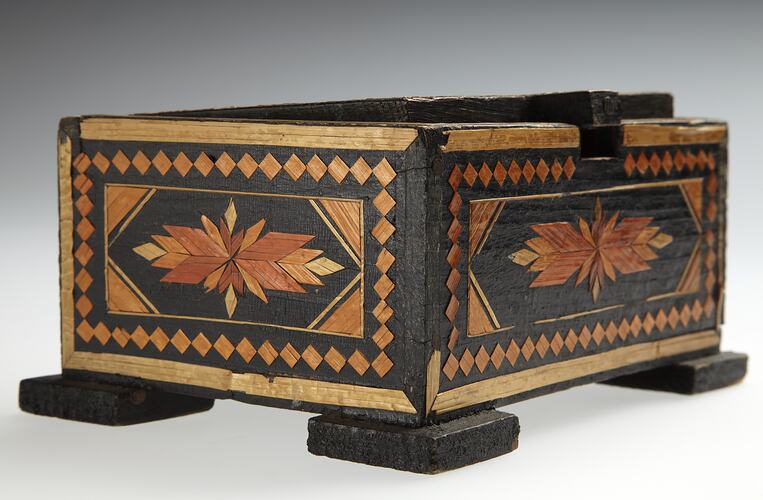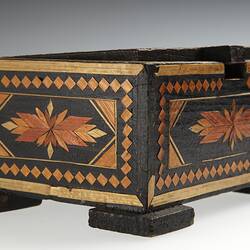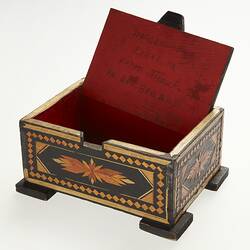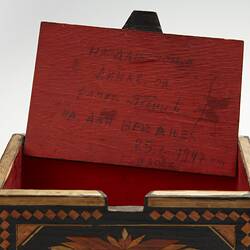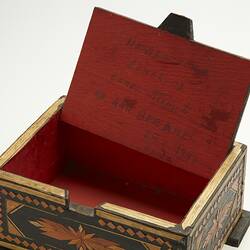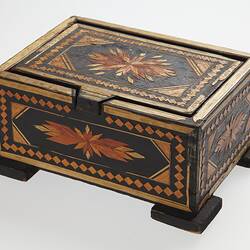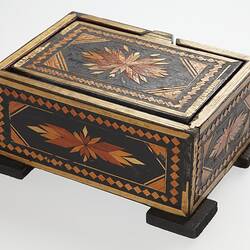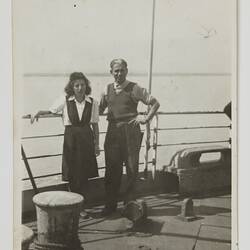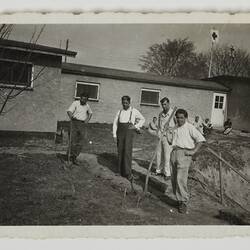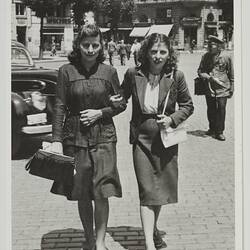Summary
Wooden inlay trinket box made for Dimka Stojkovic in a Displaced Persons Camp in Kassel, West Germany, circa 1947. Dimka Stojkovic (nee Dimitrinka Nikolova Caraschobanova) was born in Bulgaria in 1919. After long and harrowing wartime experiences in German labour camps, she met her future husband Vojislav Stojkovic, a captured soldier from the former Yugoslavia, now Serbia. They ended up in the same refugee camp in West Germany, and were married there in 1947.
The couple migrated to Melbourne via Naples on the Protea in 1948. They went directly to Bonegilla Migrant Reception Centre in Albury, although they both quickly found work in Melbourne. In 1952 they had a daughter, Nada, and in 1956 another daughter, Lily. They purchased a house in Footscray in the 1950s and took in many boarders, mostly recently arrived migrants. Dimka worked at the Bradmill Cotton Mill and then the Myer Cafeteria. Dimka died in 1998
Physical Description
Wood inlay box in light and dark shades of brown wood. Box has four square wooden feet and a lid held in place by a metal pin (the other pin is missing). The interior of the box is painted red. The inlay is a series of geometric patterns with a central geometric flower-shaped shape on each side of the box and on the lid.
Significance
This item forms part of the Stojkovic family collection which represents the experiences of thousands of displaced persons and refugees from post World War II Europe and their efforts to survive both during the war and afterwards. It also illustrates the challenges faced by these migrants on arrival in Australia as they attempted to begin new lives often with limited English and little support.
This box is a rare example of the items made in many post World War II displaced persons camps in Europe which have survived and are well provenanced. It represents the skill, ingenuity and requirement to 'make do' in the basic conditions in which people lived, often for extended periods of time.
More Information
-
Collecting Areas
-
Acquisition Information
Donation from Mrs Nada Stojkovic, 14 Jan 2010
-
Place & Date Made
-
User
Mrs Dimka Stojkovic, Kassel, Kassel, Hesse, Germany, circa 1947
-
User
Mrs Dimka Stojkovic, Melbourne, Victoria, Australia, 1948-1998
-
Inscriptions
Inside lid: HA.AAP. BOIE. K/ANHKE. OD./(2 undeciphered words)/HA. AAH. BERL(?)AHE/25.6.1947/KACTL(?)
-
Classification
-
Category
-
Discipline
-
Type of item
-
Overall Dimensions
165 (Width), 110 (Depth), 75 (Height)
-
Keywords
Brought Goods, Bulgarian Immigration, Displaced Persons, Displaced Persons Camps, Immigration, Immigration Policies
